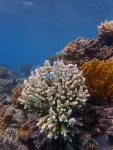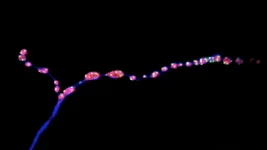(Press-News.org) FORT LAUDERDALE/DAVIE, Fla. - It's good to have friends.
Most humans have experienced social anxiety on some level during their lives. We all know the feeling - we show up to a party thinking it is going to be chock full of friends, only to find nearly all total strangers. While we typically attribute the long-lasting bonds of social familiarity to complex thinkers like humans, growing evidence indicates that we underestimate the importance of friendship networks in seemingly "simple" animals, like fish, and its importance for survival in the wild. To better understand how familiarity impacts social fishes, a group of research scientists studied this idea using schooling coral reef fish.
"We studied how the presence of 'friends' versus 'strangers' affected how fish responded to a predator threat," said lead author Lauren Nadler, Ph.D., an assistant professor in Nova Southeastern University's (NSU) Halmos College of Arts and Sciences. "The presence of 'strangers' seemed to distract fish, making them react more slowly and greatly increasing the chance that they would become lunch for a hungry predator when in the wrong social scene."
You can find the study published online in the journal Communications Biology.
Nadler and her colleagues believe that their results come down to trust. In social animals living in the wild, individuals rely on their buddies to alert them if a predator is lurking, but they need to balance the risk of being eaten against the wasted energy of reacting to inaccurate information. So, individuals will alter their sensitivity to social information based on the level of familiarity in the group, and hence trust in the information's accuracy.
"Trust among individuals is critical. This is true for humans as well as many other species, including fishes," said co-author Jacob Johansen, Ph.D., assistant professor at University of Hawaii Manoa. "Our research in fishes show that when accurate information transfer breaks down, so too does the chance of survival for the individual and the group as a whole."
Further, the researchers' results seemed to be driven by a combination of greater vigilance by the first fish to detect the predator, as well as more effective information sharing among neighboring fish.
"Our work shows that readiness to react to a threat depends on who is around you, if you are a fish," said Dr. Paolo Domenici, Research Director with the Institute of Biophysics at the Italian National Research Council "If you are in an unfamiliar social environment, this is already something you need to pay attention to. If you are surrounded by familiar individuals, then you will be able to pay attention to any external threat more readily."
As escape performance underpins survival from predator attacks, these results help us to understand why animals have evolved to prefer associating with "friends" rather than "strangers", due to the implications for both individual and group-level survival in the wild.
"Friendship networks matter, both for humans and for less evolved taxa like fishes," said Mark McCormick, Ph.D., of the ARC Centre of Excellence for Coral Reef Studies. "The more you can rely on your friends, the easier and more fulfilling your life will be."
INFORMATION:
Be sure to sign up for NSU's RSS feed so you don't miss any of our news releases, guest editorials and other announcements. Please sign up Online (https://news.nova.edu/subscribe/). You can also follow us on Twitter @NSUNews.
About Nova Southeastern University (NSU): At NSU, students don't just get an education, they get the competitive edge they need for real careers, real contributions and real life. A dynamic, private research university, NSU is providing high-quality educational and research programs at the undergraduate, graduate, and professional degree levels. Established in 1964, the university includes 15 colleges, the 215,000-square-foot Center for Collaborative Research, the private JK-12 grade University School, the world-class NSU Art Museum Fort Lauderdale, and the Alvin Sherman Library, Research and Information Technology Center, one of Florida's largest public libraries. NSU students learn at our campuses in Fort Lauderdale, Fort Myers, Jacksonville, Miami, Miramar, Orlando, Palm Beach, and Tampa, Florida, as well as San Juan, Puerto Rico, and online globally. With nearly 200,000 alumni across the globe, the reach of the NSU community is worldwide. Classified as having "high research activity" by the Carnegie Foundation for the Advancement of Teaching, NSU is one of only 59 universities nationwide to also be awarded Carnegie's Community Engagement Classification, and is also the largest private institution in the United States that meets the U.S. Department of Education's criteria as a Hispanic-serving Institution. Please visit http://www.nova.edu for more information.
FRANKFURT, GERMANY. When SARS-CoV-2 infects a cell, it introduces its RNA into it and re-programmes it in such a way that the cell first produces viral proteins and then whole viral particles. In the search for active substances against SARS-CoV-2, researchers have so far mostly concentrated on the viral proteins and on blocking them, since this promises to prevent, or at least slow down, replication. But attacking the viral genome, a long RNA molecule, might also stop or slow down viral replication.
The scientists in the COVID-19-NMR consortium, which is coordinated by Professor Harald Schwalbe from the Institute of Organic Chemistry and Chemical Biology at Goethe University, have now completed an important ...
CAMBRIDGE, MA -- Since the Covid-19 pandemic began last year, face masks and other personal protective equipment have become essential for health care workers. Disposable N95 masks have been in especially high demand to help prevent the spread of SARS-CoV-2, the virus that causes Covid-19.
All of those masks carry both financial and environmental costs. The Covid-19 pandemic is estimated to generate up to 7,200 tons of medical waste every day, much of which is disposable masks. And even as the pandemic slows down in some parts of the world, health care workers are expected to continue wearing masks most of the time.
That toll could be dramatically cut by adopting reusable masks, according to a new study from MIT that has calculated the financial ...
With the looming threat of climate change, it is high time we embrace renewable energy sources on a larger scale. Photovoltaic systems, which generate electricity from the nearly limitless supply of sunlight energy, are one of the most promising ways of generating clean energy. However, integrating photovoltaic systems into existing power grids is not a straightforward process. Because the power output of photovoltaic systems depends heavily on environmental conditions, power plant and grid managers need estimations of how much power will be injected by photovoltaic systems so as to plan optimal generation and maintenance schedules, among other important operational aspects.
In line with modern trends, if something needs predicting, you can safely ...
Researchers in the BOTTLE Consortium, including from the U.S. Department of Energy's (DOE's) National Renewable Energy Laboratory (NREL) and the University of Portsmouth, have identified using enzymes as a more sustainable approach for recycling polyethylene terephthalate (PET), a common plastic in single-use beverage bottles, clothing, and food packaging that are becoming increasingly relevant in addressing the environmental challenge of plastic pollution. An analysis shows enzyme-recycled PET has potential improvement over conventional, fossil-based methods of PET production across a broad spectrum of energy, carbon, and socioeconomic impacts.
The concept, if further developed and implemented at scale, could lead to ...
Neurons communicate through rapid electrical signals that regulate the release of neurotransmitters, the brain's chemical messengers. Once transmitted across a neuron, electrical signals cause the juncture with another neuron, known as a synapse, to release droplets filled with neurotransmitters that pass the information on to the next neuron. This type of neuron-to-neuron communication is known as evoked neurotransmission.
However, some neurotransmitter-packed droplets are released at the synapse even in the absence of electrical impulses. These miniature release events -- or ...
Every spring, the Daylight Saving Time shift robs people of an hour of sleep - and a new study shows that DNA plays a role in how much the "spring forward" time change affects individuals.
People whose genetic profile makes them more likely to be "early birds" the rest of the year can adjust to the time change in a few days, the study shows. But those who tend to be "night owls" could take more than a week to get back on track with sleep schedule, according to new data published in Scientific Reports by a team from the University of Michigan.
The study uses data from continuous sleep tracking ...
Forensics specialists can use a commercial assay targeting mitochondrial DNA to accurately discriminate between wolf, coyote and dog species, according to a new study from North Carolina State University. The genetic information can be obtained from smaller or more degraded samples, and could aid authorities in prosecuting hunting jurisdiction violations and preserving protected species.
In the U.S., certain wolf subspecies or species are endangered and restricted in terms of hunting status. It is also illegal to deliberately breed wolves or coyotes with domesticated dogs.
"If ...
EAST LANSING, Mich. - Diagnosing a rare medical condition is difficult. Identifying a treatment for it can take years of trial and error. In a serendipitous intersection of research expertise, an ill patient in this case a child and innovative technology, Bachmann-Bupp Syndrome has gone from a list of symptoms to a successful treatment in just 16 months.
The paper chronicling this lightning-fast scientific response to the Bachmann-Bupp Syndrome was published in the open-access journal, eLife.
For more than 25 years, André Bachmann, professor of pediatrics in Michigan State University College ...
New research adds to a body of evidence indicating decisions about withdrawing life-sustaining treatment for patients with moderate-to-severe traumatic brain injury (TBI) should not be made in the early days following injury.
In a July 6, 2021, study published in JAMA Neurology, researchers led by UC San Francisco, Medical College of Wisconsin and Spaulding Rehabilitation Hospital followed 484 patients with moderate-to-severe TBI. They found that among the patients in a vegetative state, 1 in 4 "regained orientation" - meaning they knew who they were, their ...
By Luciana Constantino | Agência FAPESP – A pregnant woman infected by zika virus does not face a greater risk of giving birth to a baby with microcephaly if she has previously been exposed to dengue virus, according to a Brazilian study that compared data for pregnant women in Rio de Janeiro and Manaus.
A zika epidemic broke out in Brazil in 2015-16 in areas where dengue is endemic. Both viruses are transmitted by the mosquito Aedes aegypti. Some of the states affected by the zika epidemic reported a rise in cases of microcephaly, a rare neurological disorder in which the baby’s brain fails to develop completely. Others saw no such rise.
According to this new study by Brazilian researchers, two factors explain the rise in microcephaly in only some areas: the ...


